The Radiation-Induced Myelosuppression Treatment Market is estimated to be valued at USD 3.2 billion in 2025 and is projected to reach USD 4.3 billion by 2035, registering a compound annual growth rate (CAGR) of 3.1% over the forecast period.
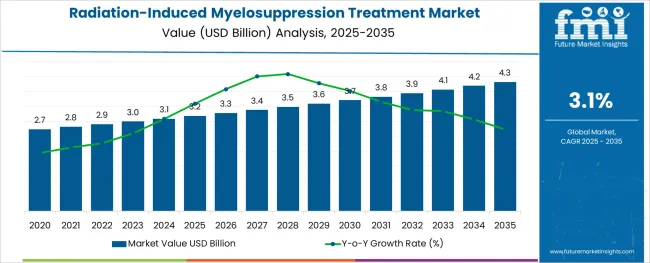
The radiation-induced myelosuppression treatment market is expanding as the incidence of radiation therapy increases in cancer care. Management of side effects like neutropenia has become critical to ensure patients can safely complete treatment regimens. Medical insights emphasize the importance of supportive care to reduce infection risk and improve patient outcomes during therapy.
Growth in oncology treatments and rising awareness about radiation-induced complications have driven demand for effective management solutions. Advances in drug formulations and administration techniques have improved patient adherence and comfort.
Healthcare systems are also prioritizing early intervention to prevent severe myelosuppression and related hospitalizations. Looking forward, the market is expected to grow further due to ongoing clinical developments and expanding radiation therapy applications. Segmental growth is anticipated to be led by neutropenia as the primary indication, growth factors as the preferred drug class, and injectable routes of administration for their rapid and targeted therapeutic effect.
The market is segmented by Indication, Drug Class, Route of Administration, and Distribution Channel and region. By Indication, the market is divided into Neutropenia, Anemia, and Thrombocytopenia. In terms of Drug Class, the market is classified into Growth factors, Erythropoietin stimulating agents, Thrombopoietic agents, and Iron supplements. Based on Route of Administration, the market is segmented into Injectable and Oral. By Distribution Channel, the market is divided into Hospital pharmacies, Retail pharmacies, Online pharmacies, and Drug stores. Regionally, the market is classified into North America, Latin America, Western Europe, Eastern Europe, Balkan & Baltic Countries, Russia & Belarus, Central Asia, East Asia, South Asia & Pacific, and the Middle East & Africa.
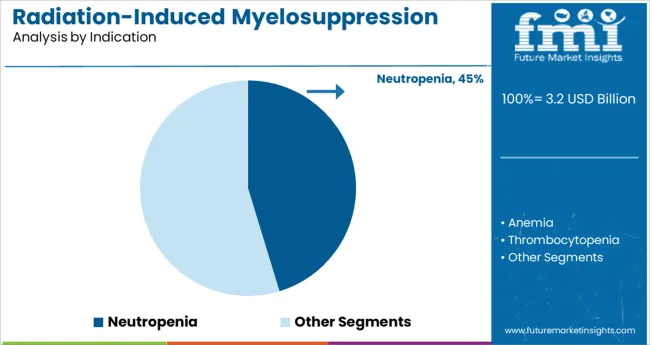
The neutropenia segment is projected to represent 45.3% of the market revenue in 2025, establishing itself as the leading indication. This segment’s growth is driven by the high incidence of neutropenia as a common dose-limiting toxicity in radiation therapy. Healthcare providers prioritize managing neutropenia to reduce infection risks and treatment interruptions.
The segment benefits from standardized clinical protocols focusing on neutrophil count restoration and immune support. Early diagnosis and proactive management have increased demand for targeted treatments within this indication.
As radiation therapies expand in scope, neutropenia management remains a crucial clinical focus, ensuring this segment’s sustained growth.
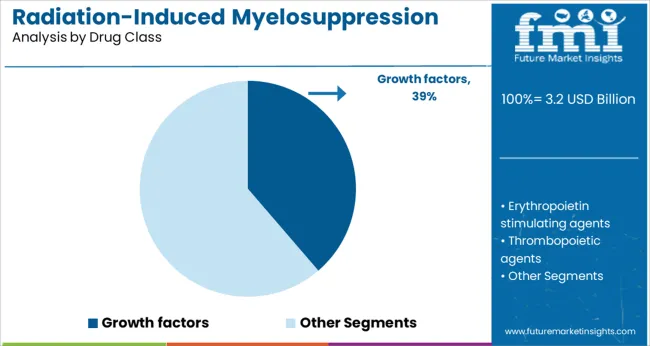
Growth factors are expected to account for 38.7% of the market revenue in 2025, maintaining their position as the dominant drug class. Their role in stimulating bone marrow recovery and enhancing neutrophil production makes them central to managing radiation-induced myelosuppression.
These drugs have been widely adopted due to their efficacy in reducing the duration and severity of neutropenia. Treatment protocols often incorporate growth factors as standard supportive care to minimize infection risk and improve patient resilience.
Ongoing research into optimized dosing and new formulations continues to reinforce the importance of this drug class. As the demand for effective myelosuppression management grows, growth factors are anticipated to retain their leading role.
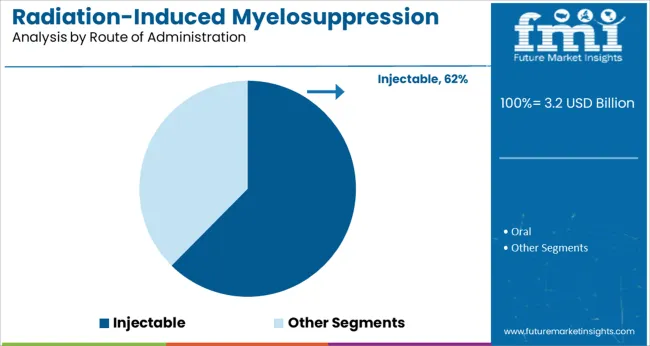
The injectable segment is projected to hold 62.4% of the market revenue in 2025, positioning it as the preferred route of administration. The injectable form allows for rapid delivery and precise dosing, which is critical in managing acute myelosuppressive conditions.
Clinicians favor this route for its ability to provide immediate therapeutic effects and enable controlled administration in clinical settings. Patient adherence is also enhanced through supervised injections, particularly in hospital or outpatient care environments.
Injectable therapies have been developed with improved safety profiles to minimize adverse effects. Given the need for effective and timely intervention in radiation-induced myelosuppression, the injectable route is expected to remain the dominant choice for drug delivery.
| Particulars | Details |
|---|---|
| H1, 2024 | 3.42% |
| H1, 2025 Projected | 3.12% |
| H1, 2025 Outlook | 2.62% |
| BPS Change - H1, 2025 (O) - H1, 2025 (P) | (-) 50 ↓ |
| BPS Change - H1, 2025 (O) - H1, 2024 | (-) 80 ↓ |
Future Market Insights presents a comparative analysis about the market growth rates and development prospects in the global market. According to FMI analysis, the radiation-induced myelosuppression treatment market is expected to drop by 80 Basis Point Share (BPS) in H1- 2025 compared to H1-2024.
However, BPS change of only 50 BPS was observed when comparing H1-2025 Outlook and H1-2025 Projected growth. Key reason for this dip in BPS is attributed to the factor such as stringent government regulations and approval process for pipeline products, which impacted the growth of the market.
However, some positive factors which will influence the market growth in future include new developments and introduction of novel therapeutics for treatment of radiation induced myelosuppression. For instance, on Feb 2024, FDA approved trilaciclib (Cosela, G1 Therapeutics) for lowering the rate of chemotherapy-induced myelosuppression (CIM) in adult patients suffering from extensive-stage small-cell lung cancer (ES-SCLC).
Demand in the radiation-induced myelosuppression treatment market is projected to increase at a 3.1% CAGR, in comparison to the 3.4% CAGR registered between 2013 to 2035.
The availability of various growth factors and favorable treatment guidelines have made the management of neutropenia easier. However, thrombocytopenia and anemia are still posing a burden on the healthcare system.
Thrombocytopenia can be managed with the help of available growth factors, but most of them are off-label. The management of anemia remains a challenge for cancer patients who receive radiation therapy for cancer treatment.
Due to changes in reimbursement and labeling of medications for anemia, the use of off-label indication erythropoietin-stimulating agents has decreased to an extent. This has resulted in growing need for blood transfusion, which is associated with various risk factors.
This, in turn, is underscoring the significance of myelosuppression treatment therapeutics and drugs, which is expected to boost the market over the assessment period.
Anemia is a common consequence of chronic kidney diseases (CKD) and radiation-induced myelosuppression. Due to the insufficiency of erythropoietin synthesis, patients suffer from anemia. However, the combination of erythropoiesis-stimulating agents (ESA) and iron has become a standard treatment for anemia.
ESAs effectively increase the hemoglobin (Hb) levels in patients. However, their use has been associated with increased cardiovascular risk, especially due to high dose intake in inflamed and hyporesponsive patients.
Iron deficiency is another consequence of anemia. This has resulted in the introduction of intravenous iron therapy which is beneficial for anemic patients, CKD patients, and patients dealing with heart failure.
A new class of drugs, namely prolyl hydroxylase domain (PHD) inhibitors is now available for the treatment of anemia. These drugs effectively stimulate the synthesis of endogenous erythropoietin and increase iron availability.
In addition to this, in February, the USA Food and Drug Administration (FDA)approved Cosela (Trilaciclib) as the first line of treatment in its class to reduce the frequency of bone marrow suppression in adults, which is caused by chemotherapy for the extensive stage.
Such developments are expected to provide impetus to the growth of the market over the assessment period, opines FMI.
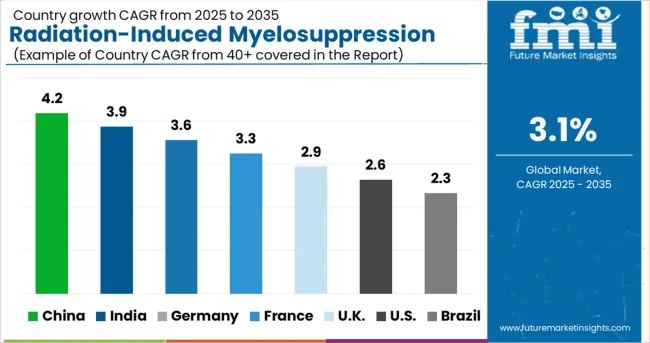
High Prevalence of Chemotherapy Induced Myelosuppression Will Spur Demand in the USA
The USA is expected to dominate the North America radiation-induced myelosuppression treatment market owing to growing incidence of cancer, chronic kidney diseases (CKD), and patients dealing with heart failure.
The presence of leading market players and fast-tracked approvals by the FDA are expected to augment the growth of the USA market. In addition to this, the USA is home to a vast healthcare sector, which is expected to provide opportunities for growth to market players over the assessment period.
Healthcare Providers are Prescribing Myelosuppressive Chemotherapy Drugs To improve Bone Marrow Function
China is expected to account for a lion’s share of the East Asia radiation-induced myelosuppression treatment market. Increasing geriatric population in the country, along with high incidence of cancer and heart failure are spurring the demand for myelosuppression treatment drugs.
Further, increasing research and development activities for the development of iron deficiency treatment is expected to augment the growth of the market. Iron deficiency is a consequence of anemia caused by chemotherapy radiation.
Growing preference for erythropoiesis-stimulating agents (ESAs) for iron deficiency in the country is anticipated to boost the market in the forthcoming years.
Surging Trend of Medical Tourism Will Boost Sales of Myelosuppression Chemotherapy Drugs
The UK is expected to emerge as a lucrative pocket in the Europe radiation-induced myelosuppression treatment market owing to the influx of medical tourists in the country, along with the availability of superior healthcare facilities.
Increasing adoption of technologically advanced medical equipment for the treatment of various chronic disorders such and cancer and kidney failure in the country is expected to augment the growth of the market in the forthcoming years.
Further, rising awareness regarding adjuvant treatment for cancer in the UK will continue boosting the market over the assessment period.
Surging Incidence of Neutropenia to Drive Preference for Myelosuppression Treatment Regimen
Based on indication, sales in the neutropenia segment are projected to account for 43.3% of the total market share in 2025. Neutropenia is a condition where an individual deals with abnormally low counts of white blood cells.
Bone marrow malfunction caused by chemotherapy radiations is a chief factor driving sales in this segment. Lack of white blood cells in patients weakens the immune system and their ability to fight infections, which makes it imperative to seek treatment for the same.
Owing to the aforementioned factors, sales in this segment are projected to increase at a considerable pace over the assessment period.
Rising Awareness Regarding New Erythropoietin Stimulating Agents Will Bolster Sales
In terms of drug class, demand in the erythropoietin stimulating agents (ESA) segment is projected to remain high over the assessment period. ESAs effectively improve the efficacy of iron therapy in anemic patients after chemotherapy radiations, which is expected to continue pushing sales in the market.
Besides this, growing preference for intravenous iron therapy with a combination of ESAs is expected to complement the growth of the market in the forthcoming years. The combination of ESAs and IV iron therapy improve the red blood cells count as compared to other treatment using ESAs alone.
Sales of Myelosuppression Chemotherapy Drugs to Remain High Via Hospital Pharmacies
Based on the sales channel, sales in the hospital pharmacies segment are projected to increase at a considerable pace owing to the wide availability of therapeutic drugs in these shops. However, high convenience and timely delivery offered by online pharmacies will place them as a lucrative segment over the assessment period.
Oral Route of Administration for Myelosuppression Chemotherapy Medication to Gain Traction
In terms of route of administration, the oral route is expected to be preferred by both healthcare professionals and patients owing to ease of administration and high efficacy. Growing preference for non-invasive treatment options will also provide impetus to sales in this segment.
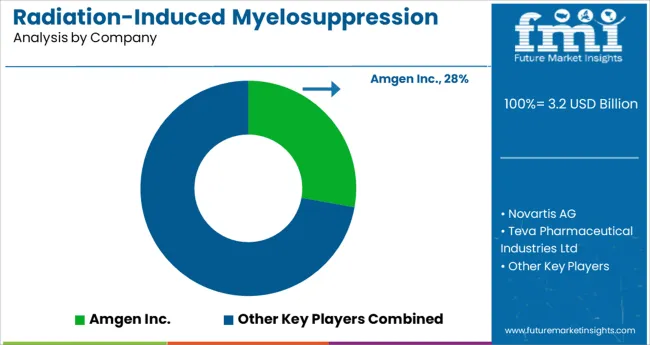
Leading players operating in the global radiation-induced myelosuppression treatment market are investing in research and development to improve lines of treatment for myelosuppression treatment. In addition to this, players are investing in mergers and acquisitions to strengthen their distribution channels.
| Attribute | Details |
|---|---|
| Forecast Period | 2025 to 2035 |
| Historical Data Available for | 2013 to 2024 |
| Market Analysis | Units for Volume and million for Value |
| Key Regions Covered | North America; Latin America; Europe; East Asia; South Asia; Oceania, and MEA |
| Key Countries Covered | United States, Canada, Brazil, Mexico, Germany, UK, France, Italy, Spain, Nordic, Russia, Poland, China, India, Thailand, Indonesia, Australia and New Zealand, Japan, GCC countries, North Africa, South Africa, others. |
| Key Market Segments Covered | Indication, Drug Class, Route of Administration, Distribution Channel, and Region |
| Key Companies Profiled | Amgen Inc.; Novartis AG; Teva Pharmaceutical Industries Ltd; Mylan N.V.; Pfizer Inc.; Janssen Global Services, LLC (Johnson & Johnson); Partner Therapeutics, Inc.; Mission Pharmacal Company; Myelo Therapeutics GmbH; Pluristem Therapeutics Inc. |
| Pricing | Available upon Request |
The global radiation-induced myelosuppression treatment market is estimated to be valued at USD 3.2 billion in 2025.
It is projected to reach USD 4.3 billion by 2035.
The market is expected to grow at a 3.1% CAGR between 2025 and 2035.
The key product types are neutropenia, anemia and thrombocytopenia.
growth factors segment is expected to dominate with a 38.7% industry share in 2025.






Full Research Suite comprises of:
Market outlook & trends analysis
Interviews & case studies
Strategic recommendations
Vendor profiles & capabilities analysis
5-year forecasts
8 regions and 60+ country-level data splits
Market segment data splits
12 months of continuous data updates
DELIVERED AS:
PDF EXCEL ONLINE
Radiation-Induced Fibrosis Treatment Market - Growth & Forecast 2025 to 2035
Chemotherapy-Induced Myelosuppression Treatment Market Growth - Forecast 2025 to 2035
Treatment-Resistant Hypertension Management Market Size and Share Forecast Outlook 2025 to 2035
Treatment-Resistant Depression Treatment Market Size and Share Forecast Outlook 2025 to 2035
Treatment Pumps Market Insights Growth & Demand Forecast 2025 to 2035
Pretreatment Coatings Market Size and Share Forecast Outlook 2025 to 2035
Air Treatment Ozone Generator Market Size and Share Forecast Outlook 2025 to 2035
CNS Treatment and Therapy Market Insights - Trends & Growth Forecast 2025 to 2035
Seed Treatment Materials Market Size and Share Forecast Outlook 2025 to 2035
Acne Treatment Solutions Market Size and Share Forecast Outlook 2025 to 2035
Scar Treatment Market Overview - Growth & Demand Forecast 2025 to 2035
Soil Treatment Chemicals Market
Water Treatment System Market Size and Share Forecast Outlook 2025 to 2035
Water Treatment Chemical Market Size and Share Forecast Outlook 2025 to 2035
Algae Treatment Chemical Market Forecast and Outlook 2025 to 2035
Water Treatment Market Size and Share Forecast Outlook 2025 to 2035
Water Treatment Ozone Generator Market Size and Share Forecast Outlook 2025 to 2035
Water Treatment Equipment Market Size and Share Forecast Outlook 2025 to 2035
Burns Treatment Market Overview – Growth, Demand & Forecast 2025 to 2035
CRBSI Treatment Market Insights - Growth, Trends & Forecast 2025 to 2035

Thank you!
You will receive an email from our Business Development Manager. Please be sure to check your SPAM/JUNK folder too.
Chat With
MaRIA